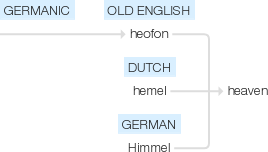Heaven
Old English heofon, of Germanic origin; related to Dutch hemel and German Himmel .
wiktionary
From a wide variety of Middle English forms including heven, hevin, heuen, and hewin(“heaven, sky”), from Old English heofon(“heaven, sky”), from Proto-West Germanic *hebn(“heaven, sky”), of uncertain origin. [1]
Cognate with Scots heiven, hewin(“heaven, sky”), Old Saxon heƀan(“heaven, sky”), Low German Heven(“heaven, sky”), Middle High German heben(“sky, heaven”), and possibly the rare Icelandic and Old Norse hifinn(“heaven, sky”), which are probably dissimilated forms of the Germanic root which appears in Old Norse himinn(“heaven, sky”), Gothic 𐌷𐌹𐌼𐌹𐌽𐍃( himins, “heaven, sky”), Old Swedish himin, Old Danish himæn and probably also (in another variant form) Old Saxon himil, Old Dutch himil (modern Dutch hemel), and Old High German himil (German Himmel). [1]
Accepting these as cognates, some scholars propose a further derivation from Proto-Germanic *himinaz(“cover, cloud cover, firmament, sky, heaven”). [2] [1]
etymonline
heaven (n.)
Old English heofon "home of God," earlier "the visible sky, firmament," probably from Proto-Germanic *hibin-, a dissimilation of *himin- (source also of Low German heben, Old Norse himinn, Gothic himins, Old Frisian himul, Dutch hemel, German Himmel "heaven, sky"), which is of uncertain and disputed origin.
Perhaps it means literally "a covering," from a PIE root *kem- "to cover" (which also has been proposed as the source of chemise). Watkins derives it elaborately from PIE *ak- "sharp" via *akman- "stone, sharp stone," then "stony vault of heaven."
The English word is attested from late 14c. as "a heavenly place; a state of bliss." The plural use in sense of "sky" probably is from the Ptolemaic theory of space as composed of many spheres, but it also formerly was used in the same sense in the singular in Biblical language, as a translation of Hebrew plural shamayim. Heaven-sent (adj.) is attested from 1640s.
